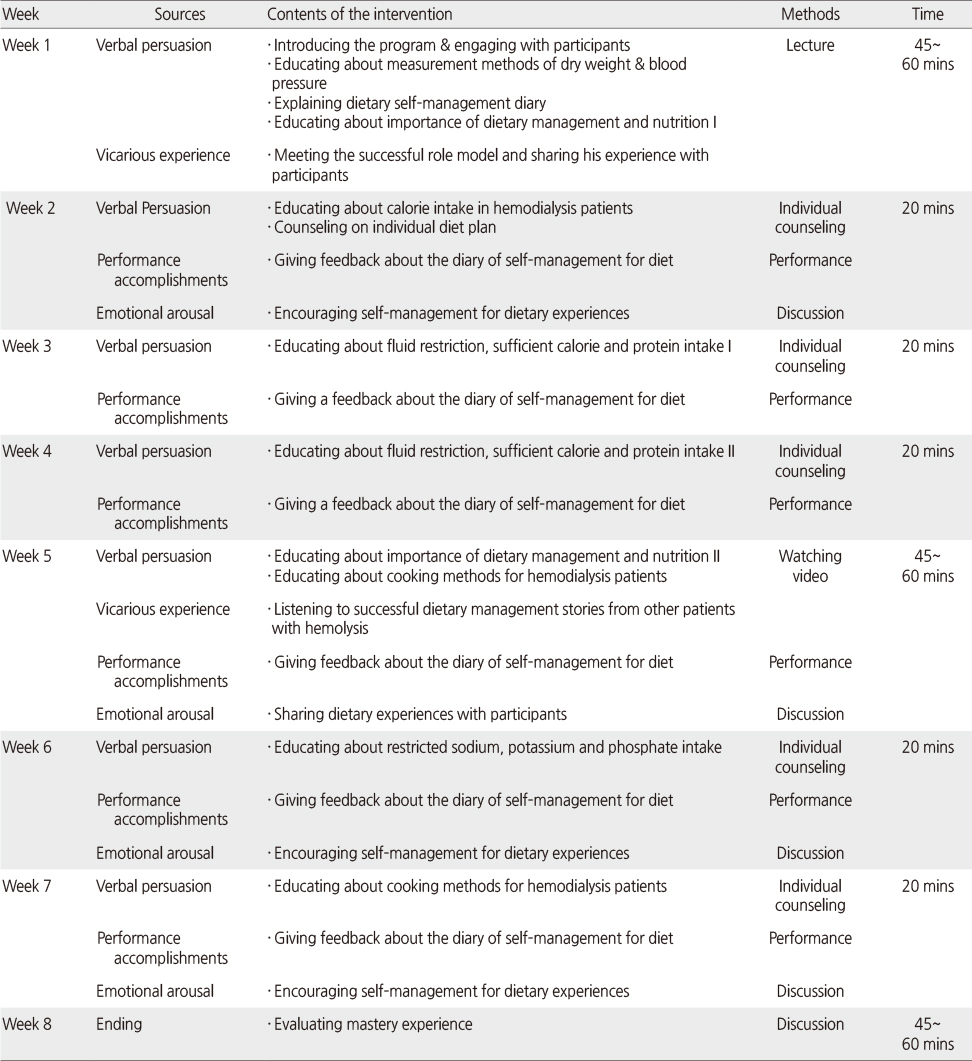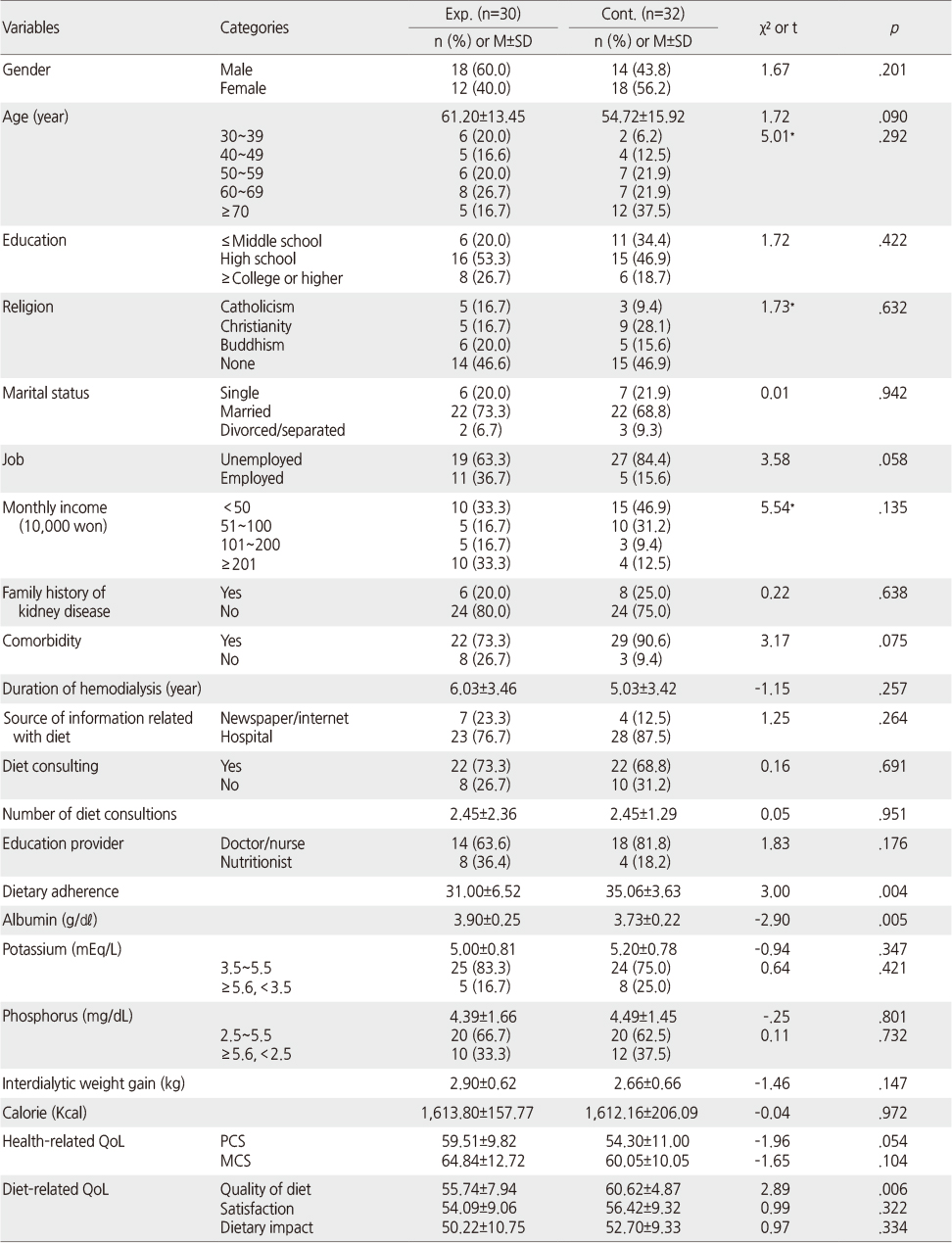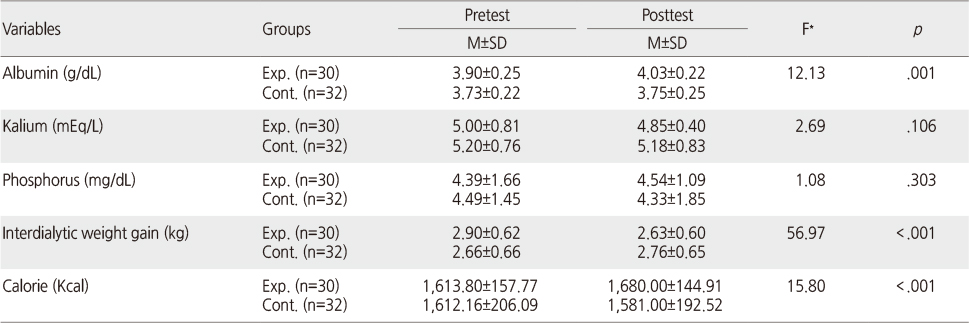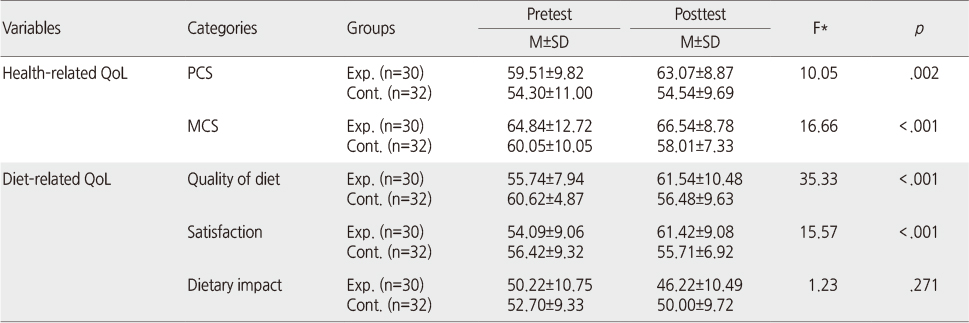Articles
- Page Path
- HOME > J Korean Acad Nurs > Volume 46(4); 2016 > Article
-
Original Article
- Effects of Dietary Program based on Self-efficacy Theory on Dietary Adherence, Physical Indices and Quality of Life for Hemodialysis Patients
- Kyung Soon Yun, Ja Yun Choi
-
Journal of Korean Academy of Nursing 2016;46(4):598-609.
DOI: https://doi.org/10.4040/jkan.2016.46.4.598
Published online: August 31, 2016
1Department of Nursing, Dongshin University, Naju, Korea.
2College of Nursing, Chonnam National University CRINS, Gwangju, Korea.
- Address reprint requests to: Choi, Ja Yun. College of Nursing, Chonnam National University, 5 Hak-dong, Dong-gu, Gwangju 501-746, Korea. Tel: +82-62-530-4943, Fax: +82-62-225-3307, choijy@chonnam.ac.kr
© 2016 Korean Society of Nursing Science
This is an Open Access article distributed under the terms of the Creative Commons Attribution NoDerivs License. (http://creativecommons.org/licenses/by-nd/4.0/) If the original work is properly cited and retained without any modification or reproduction, it can be used and re-distributed in any format and medium.
Abstract
-
Purpose
- The purpose of this study was to examine effects of a dietary program based on self-efficacy theory on dietary adherence, physical status and quality of life (QoL) in hemodialysis patients.
-
Methods
- A non-equivalent control group pre-post test design was used. The intervention group received the dietary program for 8 weeks from August 4 to September 26, 2014. The control group received only usual care.
-
Results
- ANCOVA showed that dietary adherence (F=64.75, p<.001) was significantly different between the two groups. Serum albumin (F=12.13, p =.001), interdialytic weight gain (F=56.97, p<.001), calories (F=15.80, p<.001) as physical status indices were significantly different, but serum potassium (F=2.69, p=.106) and serum phosphorus (F=1.08, p=.303) showed no significant difference between the two groups. In terms of health-related QoL, the physical component scale (F=10.05, p=.002) and the mental component scale (F=16.66, p<.001) were significantly different between the two groups. In addition, in terms of diet related QoL, diet level (F=35.33, p<.001) and satisfaction level (F=15.57, p<.001) were significantly different between the two groups, but dietary impact level (F=1.23, p =.271) was not significantly different.
-
Conclusion
- Findings show that the dietary program based on self-efficacy theory is an effective nursing intervention program to improve adherence to diet, and to maintain physical status and QoL for hemodialysis patients.
This manuscript is based on a part of the first author's doctoral dissertation from Chonnam National University.
The authors declared no conflict of interest.
- 1. Lim CS. Medical therapy in patients with chronic kidney disease. J Korean Med Assoc. 2012;55(4):381–389. Article
- 2. ESRD Registry Committee, Korean Society of Nephrology. Current renal replacement therapy in Korea: Insan memorial dialysis registry, 2014[Internet]. Seoul, Korean Society of Nephrology. cited 2016 January 1. Available from: http://www.ksn.or.kr/journal/2015/index.html
- 3. Fouque D, Kalantar-Zadeh K, Kopple J, Cano N, Chauveau P, Cuppari L, et al. A proposed nomenclature and diagnostic criteria for protein-energy wasting in acute and chronic kidney disease. Kidney Int. 2008;73(4):391–398. ArticlePubMed
- 4. Cano NJ, Miolane-Debouit M, Léger J, Heng AE. Assessment of body protein: Energy status in chronic kidney disease. Semin Nephrol. 2009;29(1):59–66. ArticlePubMed
- 5. Lee J, Kim JM, Kim Y. Association of diet-related quality of life with dietary regimen practice, health-related quality of life, and gastrointestinal symptoms in end-stage renal disease patients with hemodialysis. Korean J Nutr. 2013;46(2):137–146. Article
- 6. Noori N, Kalantar-Zadeh K, Kovesdy CP, Bross R, Benner D, Kopple JD. Association of dietary phosphorus intake and phosphorus to protein ratio with mortality in hemodialysis patients. Clin J Am Soc Nephrol. 2010;5(4):683–692. ArticlePubMedPMC
- 7. Wells JR. Hemodialysis knowledge and medical adherence in African Americans diagnosed with end stage renal disease: Results of an educational intervention. Nephrol Nurs J. 2011;38(2):155–162.PubMed
- 8. Zrinyi M, Juhasz M, Balla J, Katona E, Ben T, Kakuk G, et al. Dietary self-efficacy: Determinant of compliance behaviours and biochemical outcomes in haemodialysis patients. Nephrol Dial Transplant. 2003;18(9):1869–1873.ArticlePubMed
- 9. Hwang YH, Yi M. Evaluation of an individualized education before discharge and follow-up telephone consultation on self-efficacy for kidney transplant patients. J Korean Biol Nurs Sci. 2015;17(4):331–340. Article
- 10. Moattari M, Ebrahimi M, Sharifi N, Rouzbeh J. The effect of empowerment on the self-efficacy, quality of life and clinical and laboratory indicators of patients treated with hemodialysis: A randomized controlled trial. Health Qual Life Outcomes. 2012;10:115ArticlePubMedPMC
- 11. Seo AR, Park KS, Kim BK, Kim YL, Choi JY. A validation of dietary self-efficacy questionnaire in hemodialysis patients. Korean J Health Promot. 2012;12(1):22–30.
- 12. Kim MJ, Park CN, Kang YE, Lee SS. The effects of nutrition education and regular exercise on nutritional status, quality of life and fatigue in hemodialysis patients. J Korean Diet Assoc. 2013;19(4):373–388.Article
- 13. Bandura A. Social foundations of thought and action: A social cognitive theory. Englewood Cliffs, NJ: Prentice-Hall; 1986.
- 14. Song MS. Effects of empowerment program on the hemodialysis patients[dissertation]. Busan, Kosin University. 2004;1–112.
- 15. Pasyar N, Rambod M, Sharif F, Rafii F, Pourali-Mohammadi N. Improving adherence and biomedical markers in hemodialysis patients: The effects of relaxation therapy. Complement Ther Med. 2015;23(1):38–45. ArticlePubMed
- 16. García-Llana H, Remor E, Selgas R. Adherence to treatment, emotional state and quality of life in patients with end-stage renal disease undergoing dialysis. Psicothema. 2013;25(1):79–86. PubMed
- 17. Lee JK, Yang YH. The effects of programs using strategies for promoting self efficacy in patients with lung cancer. J Korean Acad Adult Nurs. 2006;18(4):642–652.
- 18. Tinti F, Umbro I, Giannelli V, Merli M, Corradini SG, Rossi M, et al. Acute renal failure in liver transplant recipients: Role of pretransplantation renal function and 1-year follow-up. Transplant Proc. 2011;43(4):1136–1138. ArticlePubMed
- 19. Blackburn SL. Dietary compliance of chronic hemodialysis patients. J Am Diet Assoc. 1977;70(1):31–37.ArticlePubMed
- 20. Kim HS, Lee KB, Lee YS, Kim H, Seh BS, Lim SW, et al. The reliability and the validity of health related QOL measurement method in hemodialysis patients. Korean J Nephrol. 2008;27(1):78–84.
- 21. Ware JE, Kosinski M, Bjorner JB, Turner-Bowker D, Gandek B. SF-36v2 health survey: Administration guide for clinical trial investigators. Lincoln, RI: QualityMetric, Inc; 2008.
- 22. Delahanty LM, Hayden D, Ammerman A, Nathan DM. Medical nutrition therapy for hypercholesterolemia positively affects patient satisfaction and quality of life outcomes. Ann Behav Med. 2002;24(4):269–278.ArticlePubMed
- 23. Yoo MJ. The effects of a video program for hemodialysis patients on self care, stress, and physiological indexes[master's thesis]. Gwangju, Chonnam National University. 2014;1–40.
- 24. Park MH. Effects of a self-efficacy promoting program on the selfcare behaviors and physio- psychological function in patients with continuous ambulatory peritoneal dialysis[dissertation]. Gwangju, Chonnam National University. 2004;1–104.
- 25. Jang YH, Oh HS, Jang GS. Self-care behaviors and physiological index according to cognitive function of hemodialysis patients. Korean J Health Serv Manag. 2012;6(2):57–69. Article
- 26. Ko HK, Park GJ. Effects of self-efficacy promotion program on self-efficacy, self-care behavior, and quality of life in breast cancer patients receiving radiotherapy. J Korean Oncol Nurs. 2011;11(2):136–146. ArticlePDF
- 27. Park HM, Lee HS. Effects of empowerment education program for hemodialysis patients on self-efficacy, self-care agency, self-care activities and physiologic parameters. Korean J Rehabil Nurs. 2010;13(2):151–160.
- 28. Kim JE, Hwang EA, Kwak JH, Jin KB, Yoon JS, Han SY, et al. Change of parathyroid hormone and markers of bone metabolism after renal transplantation. Korean J Nephrol. 2007;26(5):601–609.
- 29. Shim OS. The study on the elderly homodialysis patients' transition of health condition and health-related quality of life. J Korean Gerontol Soc. 2010;30(1):179–194.
- 30. Ryu EJ, Lee JM, Choi SY. The relationships of pain cognition, performance status, and hope with health-related quality of life in cancer patients. J Korean Acad Adult Nurs. 2007;19(1):155–165.
- 31. Kim Y, Hwang JS, Ahn J, Lee SM, Lee YJ, Shin S. Utilities for prostate cancer by cancer stage and treatment step in Korea. Korean J Health Econ Policy. 2013;19(2):1–20.
REFERENCES
Figure & Data
REFERENCES
Citations

- Influence of self‐management, self‐efficacy, depression and social support on quality of life in patients undergoing haemodialysis by disease stage in South Korea
Aekyung Chang, Jisoo Kim
Journal of Clinical Nursing.2025; 34(3): 978. CrossRef - Development and Effectiveness of Dietary Self-care Promotion Program Using Online Community for Hemodialysis Patients: A Pilot Randomized Controlled Trial
Hana Kim, Mi-Kyoung Cho
Asian Nursing Research.2025; 19(2): 126. CrossRef - Pharmacist-led behavioral change intervention improves adherence and clinical outcomes among hemodialysis patients
Thuraya Safaa Ansaf, Fadya Yaqoob Al-Hamadani, Sarah Brown, Delyth H. James
Scientific Reports.2025;[Epub] CrossRef - Systematic Review and Network Meta‐Analysis of the Comparative Effectiveness of Adherence Enhancement Strategies in Chronic Kidney Disease
Bin Ma, Yuanmin Jia, Haixia Wang, Ou Chen
Journal of Evidence-Based Medicine.2025;[Epub] CrossRef - Systematic Review and Network Meta‐Analysis of the Comparative Effectiveness of Self‐Management Support Strategies for Patients With Chronic Kidney Disease
Bin Ma, Haixia Wang, Yuanmin Jia, Yingying Cai, Xiaohe Ren, Yue Hou, Mengyuan Zhang, Ou Chen
Worldviews on Evidence-Based Nursing.2025;[Epub] CrossRef - Self‐management training in patients with chronic kidney disease undergoing hemodialysis: A systematic review
Ezgi Bağriaçik, Burcu Totur Dikmen
Seminars in Dialysis.2024; 37(2): 91. CrossRef - Effects of a Customized Diet Education Program Using a Mobile Instant Messenger for People Undergoing Peritoneal Dialysis: A Feasibility Test
Hyun-Jung Lee, Hee-Young Kang
Asian Nursing Research.2024; 18(4): 367. CrossRef - The effect of nurse-led interventions on non-adherence to dietary and fluid restrictions among adults receiving haemodialysis: a randomised controlled trial
Vijay VR, Harmeet Kaur Kang
Journal of Kidney Care.2023; 8(Sup6): S6. CrossRef - The effect of nurse-led interventions on non-adherence to dietary and fluid restrictions among adults receiving haemodialysis: a randomised controlled trial
Vijay VR, Harmeet Kaur Kang
Journal of Kidney Care.2023; 8(1): 12. CrossRef - Effect of Treatment Adherence Improvement Program in Hemodialysis Patients: A Systematic Review and Meta-Analysis
Hana Kim, I. Seul Jeong, Mi-Kyoung Cho
International Journal of Environmental Research and Public Health.2022; 19(18): 11657. CrossRef - Evaluation of the relationship between health literacy and self-efficacy: A sample of hemodialysis patients
Aysun Kazak, Ayşe Özkaraman, Hasret Topalı, Secil Duran
The International Journal of Artificial Organs.2022; 45(8): 659. CrossRef - Factors Affecting Diet-Related Quality of Life Among Hemodialysis Patients According to Age-group
Ae Kyung Chang, Jin Yi Choi
Clinical Nursing Research.2022; 31(6): 1172. CrossRef - Randomised controlled trial of a smartphone application‐based dietary self‐management program on haemodialysis patients
Songyi Pack, Jia Lee
Journal of Clinical Nursing.2021; 30(5-6): 840. CrossRef - Effects of the Combination of Auricular Acupressure and a Fluid-Restriction Adherence Program on Salivary Flow Rate, Xerostomia, Fluid Control, Interdialytic Weight Gain, and Diet-Related Quality of Life in Patients Undergoing Hemodialysis
AeKyung Chang, YoonChung Chung, MoonJa Kang
International Journal of Environmental Research and Public Health.2021; 18(19): 10520. CrossRef - Effects of a Mobile-App-Based Self-Management Support Program For Elderly Hemodialysis Patients
Youngsoon Min, Myonghwa Park
Healthcare Informatics Research.2020; 26(2): 93. CrossRef - Effects of a Repeated Hemodialysis Diet Education Program for Older Adults
Sangsuk Kim, Youngsil Choi
Korean Journal of Adult Nursing.2020; 32(5): 515. CrossRef - La persona con enfermedad renal crónica: una revisión sistemática de las intervenciones de salud
Alma de Coral Elías-Viramontes, Leticia Casiquen-Casique, José Ernesto Rodríguez-Loreto
Enfermería Nefrológica.2020; 23(4): 333. CrossRef - Factors Influencing Self-Care Behaviors of Renal Dialysis Patients
Yoonjung Kim, Sanggeon Park
STRESS.2019; 27(4): 320. CrossRef - Clinical trial for the control of water intake of patients undergoing hemodialysis treatment
Graziella Allana Serra Alves de Oliveira Oller, Marília Pilotto de Oliveira, Cláudia Bernardi Cesarino, Carla Regina de Souza Teixeira, José Abrão Cardeal da Costa, Luciana Kusumota
Revista Latino-Americana de Enfermagem.2018;[Epub] CrossRef - Factors Influencing Self-Efficacy, Grit, Symptom Clusters on Self-Care Agency in Brain Neoplasms Patients
Sook Hee Cho, Kyung Soon Yun, Shin Jung
Asian Oncology Nursing.2018; 18(4): 188. CrossRef - The study on developing the self care tool for the elderly cancer patient undergoing hemotherapy : Focusing on the effect of Health Monitoring Diary
Yeon Ok Lim, Yojin Kim, Hyunsook Yoon, Dae Young Zang, Dae Ro Choi, Kyoungwon Choi
Korean Journal of Health Education and Promotion.2018; 35(2): 73. CrossRef - Effects of Education about Action Plans according to Self-Monitoring on Self-Management Adherence, Knowledge, Symptom Control, and Quality of Life among Adult Asthma Patients: A Randomized Controlled Trial
Ja Yun Choi, Young-Ran Kweon
Journal of Korean Academy of Nursing.2017; 47(5): 613. CrossRef
The Dietary Self–efficacy Promotion Program
Homogeneity Test of General and Health–related Characteristics, Research Variables (N=62)
*Fisher exact test; Exp.=Experimental group; Cont.=Control group; QoL=Quality of Life; PCS=Physical Component Scales; MCS=Mental Component Scales.
Comparisons of Dietary Adherence (N=62)
*ANCOVA with pretest value as covariate; Exp.=Experimental group; Cont.=Control group.
Comparisons of Physical Status between Two Groups (N=62)
*ANCOVA with pretest value as covariate; Exp.=Experimental group; Cont.=Control group.
Comparisons of Quality of Life between Two Groups (N=62)
*ANCOVA with pretest value as covariate; Exp.=Experimental group; Cont.=Control group; QoL=Quality of life; PCS=Physical Component Scales; MCS=Mental Component Scales.
*Fisher exact test; Exp.=Experimental group; Cont.=Control group; QoL=Quality of Life; PCS=Physical Component Scales; MCS=Mental Component Scales.
*ANCOVA with pretest value as covariate; Exp.=Experimental group; Cont.=Control group.
*ANCOVA with pretest value as covariate; Exp.=Experimental group; Cont.=Control group.
*ANCOVA with pretest value as covariate; Exp.=Experimental group; Cont.=Control group; QoL=Quality of life; PCS=Physical Component Scales; MCS=Mental Component Scales.
 KSNS
KSNS
 E-SUBMISSION
E-SUBMISSION





 Cite
Cite

